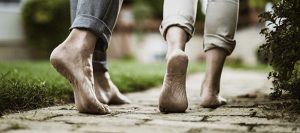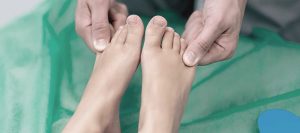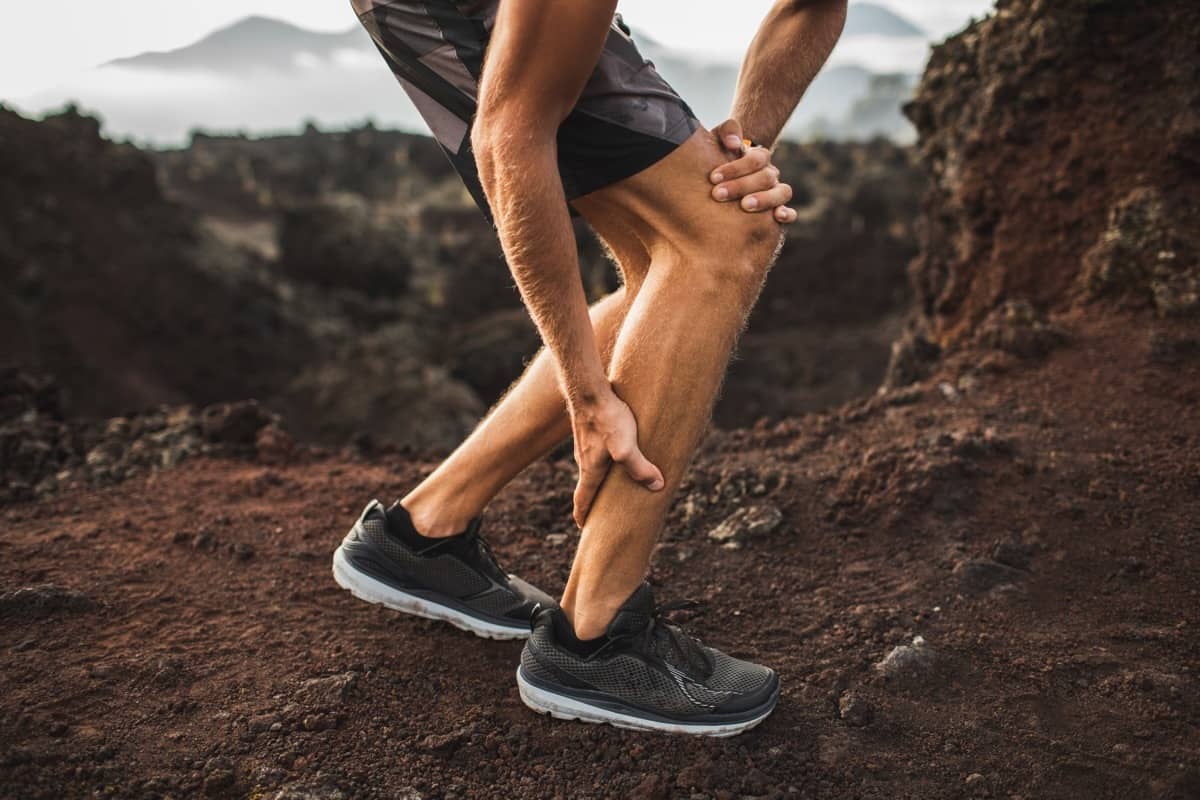
The following explains what exactly achilles tendonitis is, what the symptoms of it are and what treatments are available to help runners, and anyone for that matter, correct this often painful condition.
With every step, our Achilles feels pressure all of the time. In fact, there are few parts of the body that work harder than the Achilles.
All of the weight and force of your body is supported by it, and the movement that comes with walking means it is constantly doing its thing.
If you are a runner, you are working your Achilles even harder than most other people, which means there’s a good chance that it will feel the burn and have to cope with Achilles tendonitis at some point.
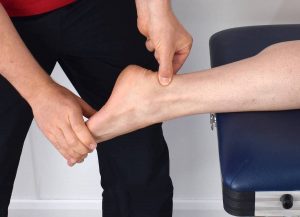
What Exactly Is Achilles Tendonitis?
The Achilles tendon is the large tendon at the back of your ankle. In fact, it is the largest tendon in your entire body.
Connecting the back of your lower calf muscles to your foot, this tendon is what provides the power when you are pushing off while walking or running.
Achilles tendonitis, also called Achilles tendinothapy, is usually the result of overuse, such as training too hard without giving the tendon time to recover from the strain put on it.
It can be exacerbated by other factors, such as poor footwear, soft running surfaces, or running uphill for extended periods of time.
Additionally, weak calf muscles, poor range of motion in the ankles, and excessive pronation have all been associated with Achilles damage.
The word damage is appropriate, because Achilles tendonitis isn’t just pain or inflammation, as the suffix “itis” usually implies.
Achilles tendonitis involves actual damage to the fibers in the tendon. As we age, we become more prone to such damage.
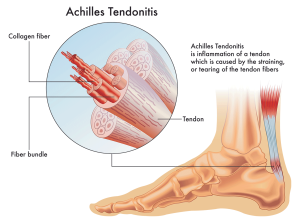
What Are The Symptoms of Achilles Tendonitis?
Common symptoms of Achilles tendonitis include:
- Pain and stiffness in the Achilles tendon when you wake up in the morning
- Pain along the tendon or back of the heel that gets worse with activity
- Severe pain in the tendon the day after you exercise
- Thickening of the tendon
- Bone spur (insertional tendinitis)
- Swelling that is present all the time and gets worse throughout the day with activity
What Treatments Are Available For This Condition?
Obviously, a painful and damaged Achilles will put a crimp in anyone’s step, but for runners and joggers, in particular, Achilles tendonitis can be especially devastating.
Fortunately, most cases can be effectively and simply treated such that you will be back in stride in relatively short order.
The folks at Runners Connect have some wonderful tips which we also recommend to our running and jogging patients.
These easy steps can help reduce pain and swelling while also helping your tendons heal:
- Eccentric heel drops
- Ice your tendons after each time you run
- Heat your tendons with warm water or a heating pack before each run
- Contrast bath during the day – take two small buckets/trash cans and fill one with hot (hot bath temp) water and the other with ice water (cold enough so some ice still doesn’t melt) and put your whole leg (up to the calf) in the cold. Hold for 5 minutes and then switch to the hot for 5 minutes. Repeat 2 or 3 times, ending with cold. This helps rush blood in and out of the area, which facilitates healing
- Avoid anti-inflammatory medications like Advil or ibuprofen
- Avoid excessive stretching – only very light, easy stretching until healed
- Massage your calves with a foam roller
- Switch to more supportive or traditional running shoes (higher heels) during your runs and while walking around until your pain is completely gone, and avoid flats and high heels
- Perform ankle strengthening and mobility exercises.
Of course, these steps may not work for more severe Achilles injuries.
In these cases, prescription steroid injections such as cortisone may be recommended by your podiatrist, and if pain persists for more than six months after non-surgical options, exercises, and medications have been exhausted, surgery may be required to fully repair the damaged tendon, as described in the following video.
Call JAWS Podiatry Today to Schedule an Appointment
Whether you are an avid runner or not, please call us if you are experiencing pain, swelling, or other problems with your Achilles tendon.
At JAWS Podiatry in Hollywood, Florida, we know how painful and frustrating such problems can be.
We utilize the most advanced and non-invasive techniques to reduce foot and ankle pain and speed recovery.
Please call us today at (954) 922-7333 or contact us online to schedule a consultation.
- The Life-Changing Power of Cosmetic Foot Surgery - February 27, 2023
- What Are The Most Common Pediatric Foot Conditions? - October 5, 2020
- 4 Important Things To Know Before Having Foot Surgery - September 21, 2020


